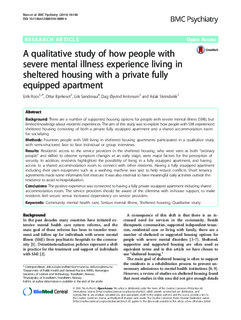A qualitative study of how people with severe mental illness experience living in sheltered housing with a private fully equipped apartment
Journal article, Peer reviewed
Permanent lenke
http://hdl.handle.net/11250/2429894Utgivelsesdato
2016Metadata
Vis full innførselSamlinger
Sammendrag
Background:
There are a number of supported housing options for people with severe mental illness (SMI), but limited knowledge about residents’ experiences. The aim of this study was to explore how people with SMI experienced sheltered housing consisting of both a private fully equipped apartment and a shared accommodation room for socializing.
Methods:
Fourteen people with SMI living in sheltered housing apartments participated in a qualitative study with semi-structured face to face individual or group interviews.
Results
Residents’ access to the service providers in the sheltered housing, who were seen as both “ordinary people” and skilled to observe symptom changes at an early stage, were major factors for the perception of security. In addition, residents highlighted the possibility of living in a fully equipped apartment, and having access to a shared accommodation room to connect with other residents. Having a fully equipped apartment including their own equipment such as a washing machine was said to help reduce conflicts. Short tenancy agreements made some informants feel insecure. It was also essential to have meaningful daily activities outside the residence to avoid re-hospitalization.
Conclusions:
The positive experience was connected to having a fully private equipped apartment including shared accommodation room. The service providers should be aware of the dilemma with in-house support, to make residents feel secure versus increased dependency on service providers.

